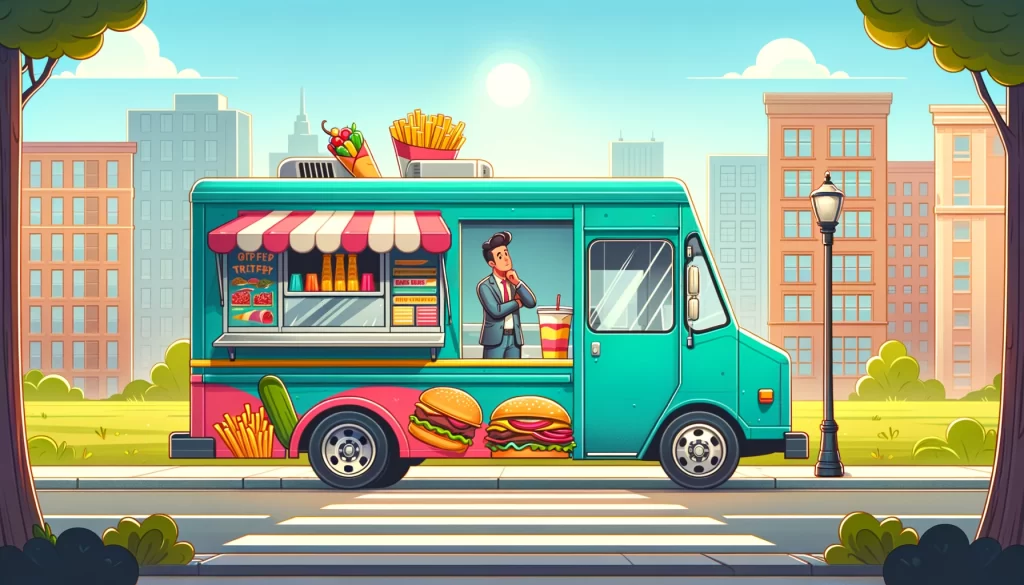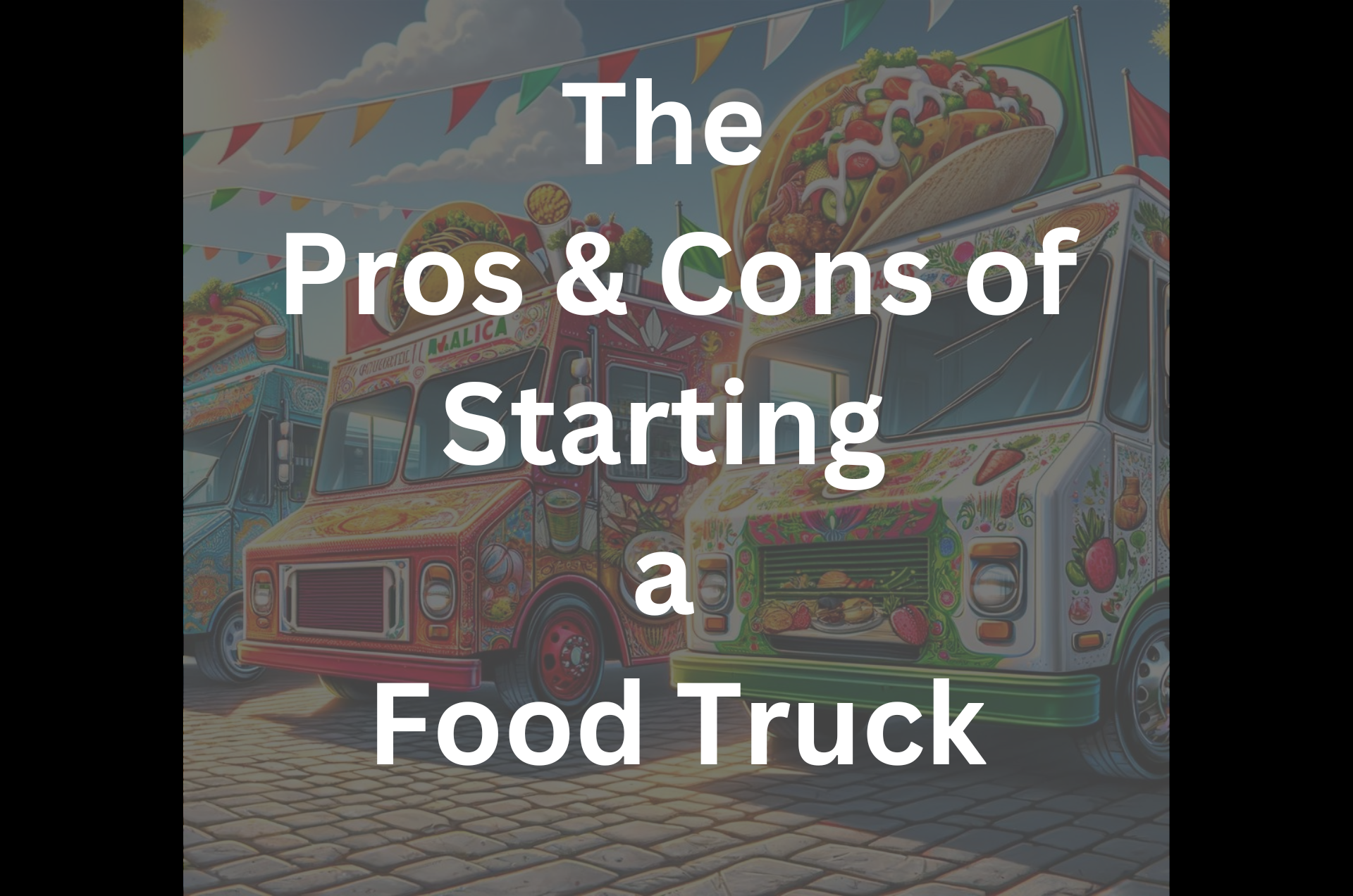**Disclosure:** We believe in honesty and transparency to the fullest extent. Some of the links on this blog are affiliate links, meaning, at no additional cost to you, we will earn a commission if you click through and make a purchase. This is one of the simplest ways you can support us.

Starting a food truck can be an exciting and rewarding venture for aspiring entrepreneurs. The food truck industry has seen significant growth in recent years, fueled by a combination of culinary creativity, lower startup costs compared to traditional restaurants, and the increasing popularity of street food culture. However, like any business endeavor, starting a food truck comes with its own set of challenges and opportunities.
This article aims to provide a comprehensive overview of the pros and cons of starting a food truck. By understanding both the benefits and potential pitfalls, you can make a more informed decision about whether this business model aligns with your goals and resources. Whether you’re drawn to the idea of culinary freedom, the lower overhead costs, or the ability to take your food to different locations, it’s essential to weigh these factors carefully.
Pros of Starting a Food Truck

- Lower Startup Costs
Compared to opening a brick-and-mortar restaurant, starting a food truck typically requires a smaller initial investment. While you still need to invest in a high-quality truck, kitchen equipment, and necessary permits, the costs are generally lower than leasing or buying a physical restaurant space. This lower financial barrier can make it easier for new entrepreneurs to enter the food service industry. - Flexibility and Mobility
One of the most significant advantages of owning a food truck is the ability to move to various locations. This mobility allows you to reach a broader customer base by setting up in different neighborhoods, attending events, festivals, and markets. This flexibility not only helps in attracting diverse customers but also allows you to experiment with different locations to find the most profitable spots. - Lower Overhead Costs
Operating a food truck can result in lower overhead costs compared to traditional restaurants. Expenses such as rent, utilities, and property maintenance are significantly reduced. Additionally, food trucks often require fewer staff members, which can further decrease operational costs. This leaner business model can lead to higher profit margins, especially if managed efficiently. - Creative Freedom
Food trucks offer a unique platform for culinary creativity. Without the constraints of a fixed menu or dining format, you have the freedom to experiment with different cuisines, fusion dishes, and seasonal specials. This creative flexibility allows you to build a unique brand identity and cater to niche markets that may be underserved by traditional restaurants. - Direct Customer Interaction
The food truck model fosters direct interaction with customers, which can be incredibly valuable for building a loyal customer base. Immediate feedback on your food and service can help you make quick adjustments and improvements. Engaging with customers face-to-face creates a personal connection that can enhance customer satisfaction and repeat business. - Growing Popularity and Market Trends
The food truck industry has been on the rise, with an increasing number of consumers seeking out unique and convenient dining options. Many successful food trucks have gained widespread recognition and even expanded into multiple trucks or brick-and-mortar establishments. This growing trend indicates a strong market demand, providing ample opportunities for new entrants to thrive.
By understanding these advantages, you can better appreciate the potential benefits of starting a food truck. However, it’s also crucial to consider the challenges and limitations, which will be discussed in the following sections.
Cons of Starting a Food Truck

- Regulatory Challenges
Starting a food truck involves navigating a complex landscape of permits and licenses. Each city or county may have its own set of regulations governing food trucks, including health department requirements, zoning laws, and parking restrictions. The process of obtaining all necessary permits can be time-consuming and sometimes frustrating. Additionally, staying compliant with ongoing health inspections and regulations requires careful attention to detail and can incur additional costs. - Weather Dependence
Unlike traditional restaurants, food trucks are heavily influenced by weather conditions. Inclement weather, such as heavy rain, snow, or extreme temperatures, can significantly impact foot traffic and sales. Seasonal variations also play a role, with potentially lower sales during colder months in some regions. Food truck operators need to have contingency plans, such as participating in indoor events or collaborating with businesses to offer delivery services, to mitigate the impact of adverse weather on their operations. - Maintenance and Operational Issues
Maintaining a food truck can be challenging and costly. Regular upkeep of the vehicle and kitchen equipment is essential to ensure smooth operations and comply with health standards. Unexpected breakdowns or repairs can lead to downtime and lost revenue. Additionally, operational issues like finding reliable parking spots, managing waste disposal, and ensuring a consistent supply of ingredients can add to the logistical complexities of running a food truck. - Limited Space
Food trucks have significantly less space than traditional restaurant kitchens, which can limit the variety and complexity of the menu. Storage constraints can also pose challenges for inventory management, requiring frequent trips to suppliers. Working in a confined space can be physically demanding and may require creative solutions for efficient workflow. Entrepreneurs must carefully plan their menu and operations to optimize the limited space available. - Competitive Market
The food truck industry is becoming increasingly competitive, especially in urban areas with a high concentration of food trucks. Standing out in a crowded market requires a strong unique selling proposition (USP) and effective marketing strategies. Food truck operators need to invest in branding, social media presence, and customer engagement to differentiate themselves from competitors and attract a loyal customer base. - Unpredictable Income
Income from a food truck can be highly variable, influenced by factors such as location, weather, and local events. Unlike a fixed-location restaurant with more predictable foot traffic, food truck sales can fluctuate daily. This unpredictability can make financial planning and budgeting challenging. To achieve financial stability, food truck operators need to diversify their revenue streams, such as catering private events, participating in festivals, and exploring partnerships with local businesses.
By understanding these challenges, aspiring food truck entrepreneurs can better prepare themselves for the realities of the business. While the cons may seem daunting, many successful food truck operators have overcome these obstacles through careful planning, adaptability, and a strong commitment to their vision.
Tips for Success in the Food Truck Business

- Thorough Market Research
Conducting comprehensive market research is crucial for the success of your food truck. Start by identifying your target audience and understanding their preferences and dining habits. Analyze potential locations, considering factors such as foot traffic, nearby competition, and local events. Researching successful food trucks in your area can provide valuable insights into market trends and customer expectations. This information will help you tailor your offerings and choose the best locations to maximize sales. - Creating a Solid Business Plan
A well-thought-out business plan serves as a roadmap for your food truck venture. Outline your business goals, target market, and unique selling proposition (USP). Include detailed financial projections, budgeting for startup costs, operating expenses, and expected revenue. Define your marketing and operational strategies, such as your menu, pricing, and branding. A solid business plan not only guides your operations but also helps attract investors or secure financing if needed. - Focus on Quality and Customer Service
Maintaining high standards for food quality and customer service is essential for building a loyal customer base. Use fresh, high-quality ingredients and pay attention to food presentation, even in the limited space of a food truck. Train your staff to be friendly and efficient, ensuring that customers have a positive experience every time they visit. Consistently delivering excellent food and service will encourage repeat business and positive word-of-mouth referrals. - Effective Branding and Marketing
Strong branding and marketing are key to standing out in the competitive food truck market. Develop a memorable brand identity, including a catchy name, logo, and visual design for your truck. Utilize social media platforms to engage with customers, share updates, and promote your locations and specials. Consider creating a website or mobile app to make it easy for customers to find you and place orders. Participating in local events, collaborating with other businesses, and offering promotions can also help increase your visibility and attract new customers. - Adaptability and Innovation
The food truck industry is dynamic, and staying adaptable is crucial for long-term success. Stay updated with industry trends, such as popular cuisines, dietary preferences, and emerging technologies. Continuously innovate your menu, introducing new items and seasonal specials to keep customers excited. Be open to customer feedback and make adjustments based on their preferences. Flexibility and willingness to adapt will help you stay competitive and responsive to changing market demands.
By following these tips, aspiring food truck entrepreneurs can enhance their chances of success and build a thriving business. While the road to success may have its challenges, a combination of careful planning, dedication to quality, and effective marketing can lead to a rewarding and profitable food truck venture.
Conclusion
Starting a food truck business can be a rewarding venture with numerous advantages, including lower startup costs, flexibility, and creative freedom. However, it also comes with its share of challenges, such as regulatory hurdles, weather dependence, and operational complexities. By thoroughly understanding the pros and cons, aspiring entrepreneurs can make informed decisions about whether this path aligns with their goals and resources.
Success in the food truck industry requires a combination of careful planning, market research, and adaptability. By focusing on quality, customer service, and effective marketing, food truck operators can build a loyal customer base and navigate the competitive landscape. While the journey may be demanding, the potential rewards—both financial and personal—make it a worthwhile endeavor for those passionate about bringing their culinary creations to a wider audience.
Call to Action
Are you considering starting a food truck? We’d love to hear your thoughts and experiences! Share your ideas or ask questions in the comments below. For more resources and insights on launching your own food business, check out our other articles on entrepreneurial tips and success stories. Subscribe to our newsletter to stay updated with the latest trends and advice for aspiring entrepreneurs.










